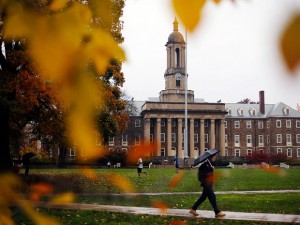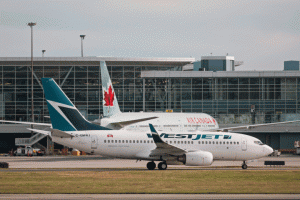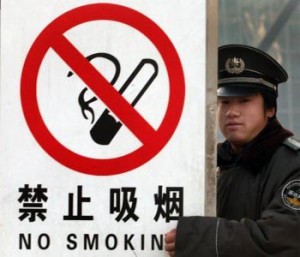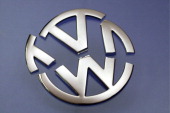Paying Student Loans by Travelling
Virtually all Canadian post-secondary students understand the struggle of looking after their finances while attending and after attending school. The majority of students borrow student loans that are worth up to tens of thousands of dollars; these debts often continue to haunt students’ lives in their 20’s, 30’s, and beyond.
The idea of allowing students to use travel points to repay their loans is an excellent idea not only for the students, but for the economy and society as a whole. While students have another method to help pay off their debts, airline companies benefit by increased incentive to travel and the government could collect outstanding debts with no extra cost to taxpayers. The decision to use travel points to repay student loans can only spell a win-win-win situation.
Airline Fees About to Go Sky High
Canadian travellers should prepare for lift-off as airlines begin to pile on new fees for their services. Starting Jan. 5, Westjet and Air Canada will be implementing several new fees that travellers will be required to pay; some of which include extra bagging check fees and fuel charges.
While frowned upon by the general public, the decision to increase flight fees is an excellent choice from a business standpoint. The decision will undoubtedly only increase Air Canada’s profits. The fact that Air Canada has virtually no competition and provides an essential service to the economy makes this a smart move on the company’s part, as Canadian consumers still have no alternatives for international flight. Not only is this market almost entirely dominated by Air Canada, entry into the market is extremely difficult. Consumers have virtually no option available to them other than express their dissatisfaction with the hike in fees.
Air Canada’s assertion of their market dominance is also done in a way that doesn’t cause a massive uproar; unlike the man who recently raised the price of an HIV drug by fifty times its original price. This tactic would minimize the amount of backlash it would receive if it had piled on all its plans for fee increases at once.
Sources:
Canadian travellers face extra passenger fees from some airlines in New Year
http://www.cbc.ca/news/business/air-canada-ceo-says-extra-baggage-fees-fuel-charges-essential-to-airline-profit-1.2983611
http://www.cbc.ca/news/business/airlines-pile-on-new-fees-and-even-more-charges-lie-ahead-experts-say-1.3323044
Tesla’s Problem….?
Tesla Motors Inc., the American automotive and energy storage company, has recently recalled all of its Model S Sedans after discovering a seat belt deficit in one of its consumers’ cars. The recall is the company’s largest, encompassing over 90,000 units.
The decision was made based off of a single report, and is believed by Tesla to be a simple manufacturing error. At first glance, it may seem absurd to how Tesla would go to such incredible lengths to make up for such a seemingly small and uncommon event. Also, many would assume that the recall would cause a negative impact on Tesla’s reputation.
However, Tesla’s actions show industry awareness and employ marketing strategies that would benefit itself, despite the possible losses incurred by the company. The timing and execution of the recall are done under ideal circumstances. Furthermore, just a few months ago, the infamous Volkswagen scandal caused irreparable damage to the automobile brand by exposing untrustworthy colors. By recalling all of its Model S Sedans after a single report of a seat belt issue, Tesla is marketing the fact that it truly cares for its consumers and is concerned about issues apart from profits. Unlike Volkswagen.
While this marketing tactic may be costly and seemingly pointless, Tesla’s strategy may prove critical during such a delicate time period for the automobile industry.
Sources:
http://www.bloomberg.com/news/articles/2015-11-20/tesla-to-recall-90-000-model-s-cars-to-check-front-seat-belts
http://www.cbc.ca/news/business/tesla-recalls-all-model-s-sedans-to-fix-seatbelt-defect-1.3328058
Asia: Lighting up or Lighting down?
Take a walk down a road through any major Asian city and the widespread presence of smoking will become clear as day. At 2.5 trillion units in circulation, China alone produces nearly half of all cigarettes in the world. To some, the habit of smoking has become a part of their culture. To others, a plague.
However, smokers in Asia may soon find themselves reconsidering their habits. A series of campaigns across many Eastern countries have taken up arms against smoking, potentially spelling havoc for the tobacco industry. While China implements harsher penalties and bans on smoking in specified areas, South Korea enacts a large cigarette tax that nearly doubles the average costs of cigarettes.
Demand for cigarettes is expected to fall throughout Asia as a result of the new battle against smoking. Tobacco industries in Asia, particularly China, are usually dominated by one or very few producers with little competition.
While these industries generate significant revenue for governments(China’s largest producer of cigarettes is government-run) and create jobs for citizens, the detriments the consumers’ health is blatantly obvious. Companies should take into consideration the effects that their products have on their consumers, and government regulation plays a crucial role in making sure companies look after their consumers. With China being home to one-third of the world’s lung cancer patients, it is about time that the tobacco industry be faced with some harder directives.
Sources:
http://www.bloomberg.com/bw/articles/2014-12-11/the-chinese-government-is-getting-rich-selling-cigarettes
http://www.bloomberg.com/bw/articles/2014-11-28/now-starring-in-chinas-anti-smoking-ads-bill-gates
http://www.bloomberg.com/bw/articles/2014-11-28/now-starring-in-chinas-anti-smoking-ads-bill-gates
Prospering in the business world: what does it mean?
It is oftentimes seen that being successful in the business world is defined as swimming in money, driving a Lamborghini, and living in a mansion. Along with this image comes a negative connotation of selfishness and greed that can never be satisfied. However, as stated in our guest lecture with Nolan Watson, success is defined only by oneself and does not need to imply a degenerate sense of morality.
Succeeding in the business world does not significantly differ from succeeding in any general walk of life. Hard work, persistence, and creativity are all necessary in order to accomplish what one desires. However, success is in the eyes of the beholder. Some look towards social enterprise, others look towards real estate. Some look towards promotions, others look towards family. Images of success vary from person to person, but the personal values held by successful people do not have to be influenced by their accomplishments.
One of the key points emphasized in the guest speaker lecture was decency as a human being. Accomplishing everything one sets out to be and becoming powerful and wealthy does not define one’s principles. Decency as a human being should and can be kept all throughout one’s career.
Citations
https://www.alumni.ubc.ca/2012/awards/nolan-watson/
http://www.businessinsider.com/the-best-definition-of-success-2013-3
Volkswagen’s existential crisis
As one of the world’s largest car manufacturers, Volkswagen had everything a business would like to be: powerful, prosperous, and illustrious. However, the entire company’s well being suddenly came under heavy fire once a scandal was unveiled, with its stock suddenly dropping an inconceivable 20%.
Volkswagen was caught cheating on EPA(Environmental Protection Agency) tests, which unveiled nearly half a million Volkswagen cars emitting up to 40 times more pollutants than authorized. The scandal has resulted in a devastating blow to Volkswagen’s public image and reputation.
This is a prime example of a company failing to operate in a manor that can be considered socially responsible and revisits the issue of business ethics. A company that does not to operate in a socially responsible manner not only fails to contribute to society in good conscience, but also puts themselves at risk in the process. In this scenario, Volkswagen’s image suffered near irreparable damage after its lack of social responsibility was publicized. Under no circumstances would such a company be looked highly upon in the same situation.
Citations
http://www.bbc.com/news/business-34324772
http://www.bloomberg.com/news/articles/2015-10-04/volkswagen-chief-warns-of-existential-threat-of-cheating-scandal
McDonald’s – I’m not lovin’ it!
As the worlds’ largest hamburger chain, Ronald McDonald’s presence is blatantly obvious in virtually all populated areas of the world. Why then, one might ask, are the company’s sales dropping at a startling rate? With a drop of six percent in its share value over the past year, it is clear that McDonald’s is certainly not lovin’ it.

Ten or twenty years ago, the thought of dining at McDonald’s would make mouths water and taste buds tingle with excitement. Today, the very same thought gives rise to feelings of disgust, inferiority, and embarrassment. In recent years, consumer tastes and preferences have traveled in a direction that is clearly harming the success of the worlds’ largest hamburger chain.
The predicament that McDonald’s currently faces portrays a concept that was discussed in a previous lecture: the need for a business to adapt in order to remain competitive and successful. Regardless of how influential or omnipresent a company seems to be, it is never safe from the volatile forces in markets. The ability to adapt to sudden changes will always be a crucial skill that businesses must have in order to maintain their prosperity; and McDonald’s is no exception to this fact.
If the company wishes to maintain its standing near the top of all fast food chains, it is imperative that it adjusts to the degenerate stigma that has been attached to the golden Mcdonald’s logo.
Citations
http://www.ctvnews.ca/business/mcdonald-s-sales-slip-in-u-s-and-overseas-1.2412175
http://www.wsj.com/articles/mcdonalds-ceo-steps-down-1422485574
Business and Society : A Symbiotic Relationship?
As a significant driving force behind numerous decisions in the business world, business ethics play an integral role in the operations of virtually any enterprise. A business, as a collective entity, is part of society.

Lean on… each other!
It should be recognized that the vast majority of enterprises are able to thrive as a result of the opportunities presented to them by society. Many regions of the world do not provide opportunities for startups or businesses. Consequently, the actions of an enterprise should be completed with a degree of social responsibility. With very few exceptions, the prosperity of a business is contingent on the prosperity of its society; therefore it is also in the business’ best interest to promote the well being of its society.
A real life scenario of this application of business ethics can be found in the article “CVS Vows to Quit Selling Tobacco Products,” by the New York Times. The article details a company by the name of CVS Caremark promising to stop selling tobacco products while also declaring a goal to get “half a million Americans to stop smoking.” The company believes that it should promote the well being of its consumers despite the projected loss of $2 billion in revenue. Therefore, this is a prime example of how a business in good conscience should make decisions with a sense of social responsibility.





